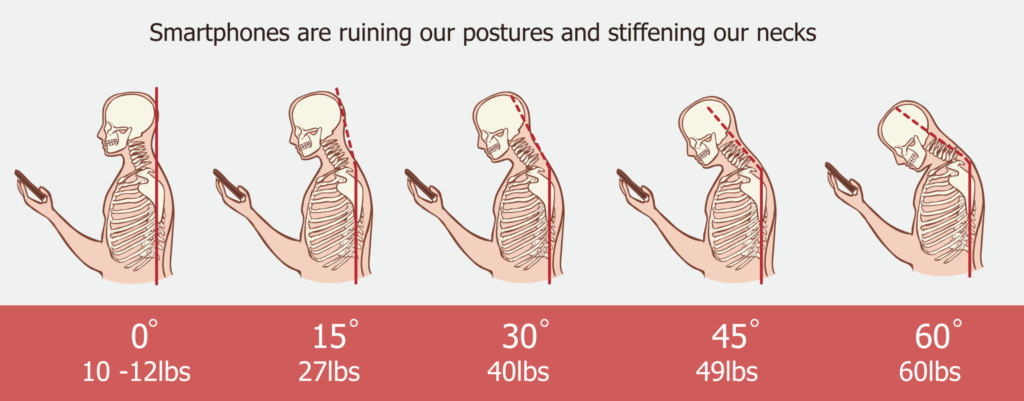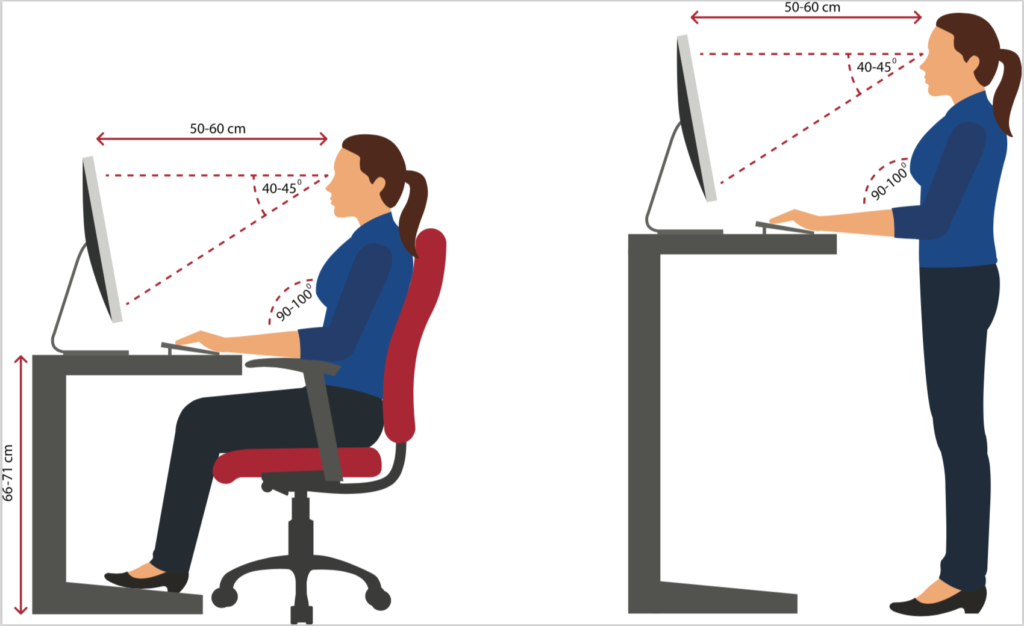You probably have heard it countless times, but take it again from a Greeley chiropractic clinic: good posture is SO important.
“Sit up straight!” Likely, you heard those words from your mom, your grandma, your teacher, and, hopefully, your chiropractor, too. So why do chiropractors often say things about your posture?
The reality is, your posture has a greater impact on your body and your health than you may realize.
Consider this for example: the average human head weighs around 10 to 12 pounds. However, as you lean your head forward, the new angle puts a greater strain (and weight) on your neck and spine. If you are tilting your head forward at only 15 degrees, your head weight is more like 27 pounds. With a 45 degree tilt forward of your head, your spine and neck have to deal with a weight of what seems like around 49 pounds. Tilting your head forward even further could put a strain of up to 60 pounds on your body. Wow!

We can hardly say it enough, our posture greatly affects our bodies!
Negative Effects Bad Posture Can Have on Your Body
Bad posture does far more than make you cringe when you see yourself in a photo or put a little extra weight on your neck. Below is a list of side effects you may experience, either right away or over time, if you have a habit of bad posture.
- Tension headaches and migraines
- Back pain, whether from disc degeneration over time or simply the excess pressure poor posture puts on your spine
- Neck and shoulder pain, as well as stiffness and tightness
- Decreased blood flow to your brain
- Compressed lungs (reduced lung capacity), affecting your breathing
- Increased muscle fatigue as a result of too much strain on certain muscles
- Poor digestion, as poor posture compresses your digestive tract along with other abdominal organs
- Constipation
- Subluxations (misaligned spine)
- Constricted nerves, as your spinal cord and other bones shift positions and get in the way of surrounding nerves
- Poor Circulation
- Sleep issues
What Causes Bad Posture?
There is a myriad of things that can begin to cause a person to have poor posture. Some of these include, but certainly are not limited to, the following:
- Weak core muscles
- Decreased Flexibility
- Unusually tight muscles
- Obesity
- Stress
- Pregnancy
- An ergonomically poor work environment
- Not holding your phone at eye level
- Wearing high heels
So What Can You Do to Correct Bad Posture?
You don’t have to continue putting harmful strain on your spine and body with poor posture. There are things you can begin putting into practice today.
A Few Simple Posture Tips
1. When standing, make sure you are putting most of your weight on your heels rather than your toes. This alone will help your body begin to straighten up. When you’re holding your weight on your toes, it forces your back muscles to work way harder and your glutes and core muscles remain disengaged. So, shift that weight back to your heels! As you stand, keep your knees slightly bent rather than locking them. Your head should be level rather than tilted forward so that your ears are aligned with your shoulders.
2. When sitting, try to choose a chair that is the right height for your body. Your feet should both be able to rest flat on the ground while your knees are either level or just a bit higher than your hips. Keep your shoulders relaxed, not hunched forward. If you have a computer in front of you, the screen should be situated at eye level so that you’re not forced to look down or lean backward as you work.

3. When carrying things, don’t carry the weight on just one shoulder (For this reason, a backpack type of bag is better suited than a purse for carrying your things). Distribute the weight evenly between both shoulders and make sure the straps of your backpack are properly adjusted to fit your body.
4. Make sure you’re moving around! Don’t sit or stand in one position for long periods of time. Set yourself a reminder to get up and walk around or otherwise get your body moving.
5. Hold your mobile device at eye level rather than tilting your head forward and looking down at your screen.
Exercises to Help Posture
- Work on strengthening your core. Some examples of exercises include doing planks or the bridge exercise.
- Exercise your shoulders to remind them of good posture by doing the wall angel.
- Do the shoulder squeeze to help strengthen muscles in your shoulders and upper back.

Find more exercises and stretches to help your posture here.
Go See Your Chiropractor
In addition to doing exercises and making the effort to keep your posture in check, it’s important that you see your chiropractor for regular maintenance. Your chiropractor may notice things about you and your posture that you are not even aware of.
For example, a qualified chiropractor will check the position and height of the hips, the curves of your spine, the curve of your neck, the height of your shoulders, and any other indications or causes of poor posture. The chiropractor can then take these visual cues of what may be happening with your body and adjust you accordingly. Making sure your spine and the rest of your body is properly aligned plays a significant role in your posture.
If you’re looking for a chiropractor who can help you begin fighting poor posture and the symptoms that come along with it, contact Weld Family Clinic today.


